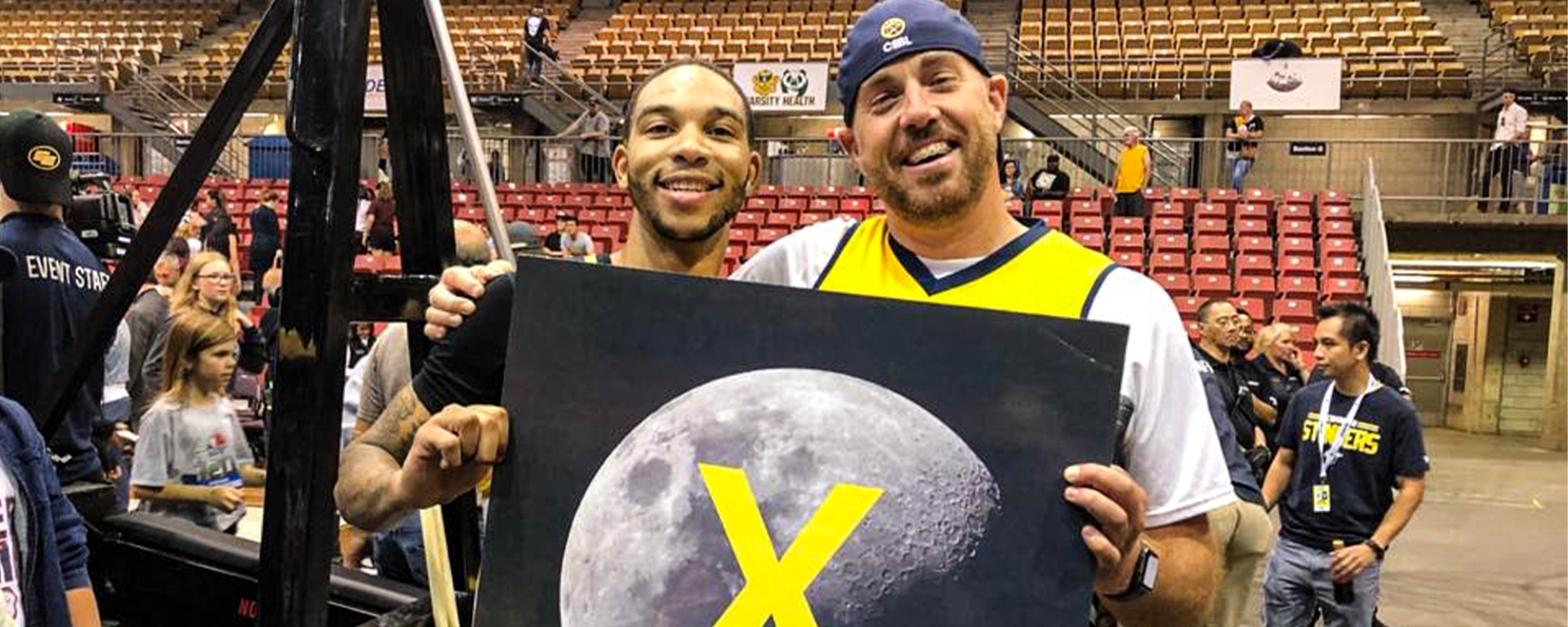Stingers help fan recover, and rebound, from mental illness
Jason Hills • January 29, 2020

After Edmonton Stingers’ devastating loss to the Saskatchewan Rattlers during the CEBL Championship Weekend in August 2019, Stingers fan Jeff Cummings made a point to talk to every player and relay a very important message.
It wasn’t your typical, “Good game, we’ll get them next time”-message. It was much more meaningful than that. Carried more impact. A heartfelt message that many athletes would view as the ultimate compliment.
“I told them that they got me out of bed every morning, and gave me something to look forward to each week. Going to their games and watching them helped me get through my journey and struggle with my mental health,” said Cummings.
Battling stress and depression
For the last 15 years, Cummings has been dealing with high anxiety and depression. Mental illness doesn’t discriminate and affects people of all ages. According to the Canadian Mental Health Association, in any given year, one in five people in Canada will personally experience a mental health problem or illness. Approximately eight per cent of adults will experience major depression at some time in their lives.
Like many others, Cummings often tried to hide his struggles as much as he could, but at times it became too much to handle.
Cummings recalls the first time that he tried to take his own life.
“I was dealing with a lot of issues. It was hard to make a buck, you’re struggling and barely paying the rent and putting food on your shelf,” he said.
“I was desperate, and it got so daunting, and I was so overwhelmed. It got to a point where I drove my car onto a railroad track and just sat there… for three hours. And then somebody came by, and I drove straight to the hospital.” Cummings said.
“It’s been a long journey, and sometimes I’ve hit bumps in the road where I deal with self-doubt.”
Initiatives such as #BellLetsTalk has shifted the perception and mindset for those struggling with mental illness. Since the campaign started in 2010,
86 per cent of Canadians have reported that they are more aware of mental health issues.
Relapse
But the thing about anxiety and depression, is that it can be triggered at any time. Cummings was once again overcome with the depths of depression this past year.
“I love what I do for my career so much, but I tried to devote so much of myself to it that I neglected myself,” Cummings said.
“I felt like I was the person on the outside looking in when it came to our team at work. I just burned out. I couldn’t sleep at night. I felt helpless and I made another attempt to end my life. ... So much negative self-talk. Mentally, I just thought I should kill myself, but I caught myself and asked for help.”
Cummings was placed on medical leave by his doctor and his road to recovery began again. Prior to his latest setback, Cummings was ecstatic to be joining two of his best friends as Stingers season seat holders, but his mindset was nowhere near basketball when his medical leave began.
“I didn’t want to leave the house. When I was on medical leave, all I wanted to do was stay in bed,” Cummings said.
“But my friends Jay and Andrew would come over and say, ‘Jeff, we got a game.’ That first game was really challenging to leave the house and go.”
Game on
Cummings is an avid sports fan. And, once the game tipped off, he started to feel the energy, the emotion that the game of basketball had always made him feel.
“I had a lot of fun. It reminded me to just enjoy life and enjoy myself again,” he said.
“After that game, I started to do things for myself and I’d go for walks every day. I’d see a therapist, because I had a hard time doing things for myself, but as the season wore on (the Stingers) gave me something to look forward to.”
Cummings started to use the Stingers games, and experience, to help his recovery. Him and his two friends had their regular game-day routine. They were three of the loudest fans inside the Hive, always getting their chirps in at the opposition.
Recovery
For Cummings, sports, which has always been one of his biggest passions, was fun again. But more importantly, for him life was more fun again.
“Every week, between each game, I just wanted to continue to do things for myself and enjoy life. I never walked so much in my life,” said Cummings.
“Yes, I was going through a crappy time in my life, but I was also recovering. Recovering to deal with stress better and have a positive outlook on life, and not have so much self-doubt.”
Cummings became a big fan of Stingers point guard, and reigning CEBL MVP, Xavier Moon. He created a special Xavier Moon sign, and brought it to every game. At the end of the season, when the fans gathered on the court for a group photo, Moon reached out to him and autographed the sign. They also took a photo together.
Xavier Moon
When Moon got to talk more in-depth with Cummings during the Championship Weekend, the MVP was taken back.
“I got the chance to really talk with Jeff at the Championship Weekend, and for him to open up and share that with all of us took a lot of courage,” said Moon.
“You don’t expect to hear that after a tough loss. It really puts things into perspective and lets me know not to take anything for granted. That small message meant so much.”
Cummings knows that his battle with mental health will always be with him, but after his summer spent with the Stingers and his return to work, he’s in a much better place, both mentally and physically.
“I really watch what time I go to work and what time I leave, and I take time for myself to do things I want to do,” said Cummings. Sharing your battle with mental illness isn’t easy, but Cummings is doing his best to be open and talk about his struggles. It helps him, and it can help others going through a similar struggle.
“People used to think it’s like a switch, and you can turn it off, but that’ s not the case. It’s a journey, you’re going to have relapses, but the important thing is to ask for help,” Cummings said.
“When you’re battling with depression and anxiety, the important thing is to realize you’re not alone and the hardest step is getting help, but once you do it, you’ll realize how much support you have and how much people care about you.”

